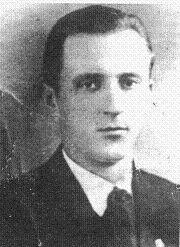
Born in 1908, Manfreda was a child when his hometown of Kobarid was annexed by Italy, and he was deeply affected by the injustices faced by the Slovenian people under Italian rule. He attended high school in Udine where, despite the highly repressive atmosphere of the time, he became an outspoken advocate for the Slovenian community. Unknown to his teachers and classmates, he also joined TIGR, a clandestine resistance organization set up by young people who were determined to fight Fascist rule and to reclaim Slovenian territories. He remained a member of TIGR when he went on to study at the University of Padua.
All the while, Manfreda kept his membership in TIGR a secret. He even joined the Fascist movement in order to dispel any suspicions. But in 1930, the authorities finally became aware of his anti-regime activity. After being monitored by intelligence agents, he was arrested and sentenced to ten years in prison by a Fascist court.
He was released as part of an amnesty program, but Manfreda continued his activism, and despite being under constant surveillance, he published several anti-Fascist tracts. His work inspired many other Slovenian men, including his younger brother Janko, to join TIGR and other resistance organizations. In 1936, however, he was rearrested. This time, there would be no amnesty and no parole.
The years of prison life, including prolonged periods of solitary confinement, had taken their toll. After suffering from lung ailments for several years, Manfreda died in a prison hospital in 1943. He would not live to see most of the Primorska region, including his hometown of Kobarid, rejoin Yugoslavia after the war.
Even though he had spent much of his life in prison, Manfreda emerged as a hero. His childhood home in Kobarid is now a library named in honor of one of the first young men to rise up against Mussolini and his Fascist dictatorship.

































































